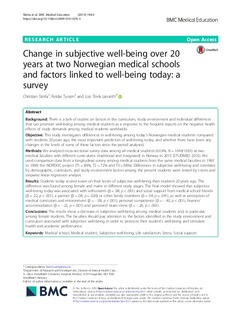| dc.contributor.author | Sletta, Christian | |
| dc.contributor.author | Løvseth, Lise T | |
| dc.contributor.author | Tyssen, Reidar | |
| dc.date.accessioned | 2019-03-05T16:48:44Z | |
| dc.date.available | 2019-03-05T16:48:44Z | |
| dc.date.created | 2019-02-13T11:40:00Z | |
| dc.date.issued | 2019 | |
| dc.identifier.issn | 1472-6920 | |
| dc.identifier.uri | http://hdl.handle.net/11250/2588894 | |
| dc.description.abstract | Background
There is a lack of studies on factors in the curriculum, study environment and individual differences that can promote well-being among medical students as a response to the frequent reports on the negative health effects of study demands among medical students worldwide.
Objective
This study investigates differences in well-being among today’s Norwegian medical students compared with students 20 years ago, the most important predictors of well-being today, and whether there have been any changes in the levels of some of these factors since the period analysed.
Methods
We analysed cross-sectional survey data among all medical students (63.9%, N = 1044/1635) at two medical faculties with different curriculums (traditional and integrated) in Norway in 2015 (STUDMED 2015). We used comparison data from a longitudinal survey among medical students from the same medical faculties in 1993 to 1999: the NORDOC project (T1 = 89%, T2 = 72% and T3 = 68%). Differences in subjective well-being and correlates by demographic, curriculum, and study environment factors among the present students were tested by t-tests and stepwise linear regression analysis.
Results
Students today scored lower on their levels of subjective well-being than students 20 years ago. The difference was found among female and males in different study stages. The final model showed that subjective well-being today was associated with self-esteem (β = .98, p < .001) and social support from medical school friends (β = .22, p < .001), a partner (β = .08, p = .020) or other family members (β = .04, p = .041), as well as perception of medical curriculum and environment (β = −.38, p < .001), personal competence (β = −.40, p < .001), finance/accommodation (β = −.22, p < .001) and perceived exam stress (β = −.26, p < .001).
Conclusions
The results show a decrease in subjective well-being among medical students and, in particular, among female students. The faculties should pay attention to the factors identified in the study environment and curriculum associated with subjective well-being in order to promote their student’s well-being and stimulate health and academic performance. | nb_NO |
| dc.language.iso | eng | nb_NO |
| dc.publisher | BMC | nb_NO |
| dc.rights | Navngivelse 4.0 Internasjonal | * |
| dc.rights.uri | http://creativecommons.org/licenses/by/4.0/deed.no | * |
| dc.title | Change in subjective well-being over 20 years at two Norwegian Medical Schools and factors linked to well-being today: a survey | nb_NO |
| dc.type | Journal article | nb_NO |
| dc.type | Peer reviewed | nb_NO |
| dc.description.version | publishedVersion | nb_NO |
| dc.source.volume | 19 | nb_NO |
| dc.source.journal | BMC Medical Education | nb_NO |
| dc.source.issue | 45 | nb_NO |
| dc.identifier.doi | 10.1186/s12909-019-1476-3 | |
| dc.identifier.cristin | 1676876 | |
| dc.description.localcode | © The Author(s). 2019 Open Access This article is distributed under the terms of the Creative Commons Attribution 4.0 International License ( http://creativecommons.org/licenses/by/4.0/ ), which permits unrestricted use, distribution, and reproduction in any medium, provided you give appropriate credit to the original author(s) and the source, provide a link to the Creative Commons license, and indicate if changes were made. The Creative Commons Public Domain Dedication waiver ( http://creativecommons.org/publicdomain/zero/1.0/ ) applies to the data made available in this article, unless otherwise stated | nb_NO |
| cristin.unitcode | 194,0,0,0 | |
| cristin.unitcode | 194,65,35,0 | |
| cristin.unitname | Norges teknisk-naturvitenskapelige universitet | |
| cristin.unitname | Institutt for psykisk helse | |
| cristin.ispublished | true | |
| cristin.fulltext | original | |
| cristin.qualitycode | 1 | |

